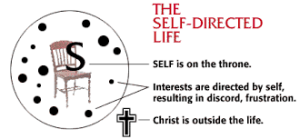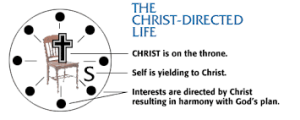Normally, there is a difference between the sermon of the week and the blog posted for the week. This week, this was not possible due to Thanksgiving and the fact that I was at Advent @ Arlington, where there was a guest speaker, Zechariah, the husband of Elizabeth, the cousin of Mary the mother of Jesus. I tried to take good notes, and here is approximately what was said:
Good morning! Let me introduce myself. My name is “Zachariah.” Many of you have never heard of me, for I am primarily known as the father of John the Baptist. I’ve come here this morning to help you understand a little bit more about my walk as a disciple of God, which I hope will help you in your discipleship walk.
Your pastor told me that you have the custom of reading scripture before the sermon, and so I am going to read you my story before I tell it to you. Here is how the Gospel of Luke tells the first part of my story:
In the time of Herod king of Judea there was a priest named Zechariah, who belonged to the priestly division of Abijah; his wife Elizabeth was also a descendant of Aaron. Both of them were righteous in the sight of God, observing all the Lord’s commands and decrees blamelessly. But they were childless because Elizabeth was not able to conceive, and they were both very old. Once when Zechariah’s division was on duty and he was serving as priest before God, he was chosen by lot, according to the custom of the priesthood, to go into the temple of the Lord and burn incense. And when the time for the burning of incense came, all the assembled worshipers were praying outside. Then an angel of the Lord appeared to him, standing at the right side of the altar of incense. When Zechariah saw him, he was startled and was gripped with fear. But the angel said to him: “Do not be afraid, Zechariah; your prayer has been heard. Your wife Elizabeth will bear you a son, and you are to call him John. He will be a joy and delight to you, and many will rejoice because of his birth, for he will be great in the sight of the Lord. He is never to take wine or other fermented drink, and he will be filled with the Holy Spirit even before he is born. He will bring back many of the people of Israel to the Lord their God. And he will go on before the Lord, in the spirit and power of Elijah, to turn the hearts of the parents to their children and the disobedient to the wisdom of the righteous—to make ready a people prepared for the Lord.” Zechariah asked the angel, “How can I be sure of this? I am an old man and my wife is well along in years.” The angel said to him, “I am Gabriel. I stand in the presence of God, and I have been sent to speak to you and to tell you this good news. And now you will be silent and not able to speak until the day this happens, because you did not believe my words, which will come true at their appointed time” (Luke 1:5-20).
Prayer: God of Miracles: Come to us today and open our hearts as we hear the story of the birth of John the Baptist. Convict us. Convert us. Make is wholly your people. In Jesus Name, Amen.
Zechariah: A Committed Disciple
On the surface, you may not think that we have much in common. I lived long time ago during the reign of Herod the Great, King of Judea (Luke 1:5). I was a priest and a descendent of Aaron (v. 5) As a priest, my job was partially to serve in the temple courts. I offered sacrifices and performed Jewish ceremonies. We priests maintained the Temple as the center of the Jewish religion.
My wife and I lived a few miles out of Jerusalem in a small place, where I had a plot of land and also worked growing food for our family. My wife’s name was Elizabeth. Elizabeth and I were both raised as devout Jews. We tried as best we could to obey the laws of Moses (v. 6), which is why we are referred to as “righteous” in your Bible. We were not perfect, but we tried to obey the instructions of Moses. Unfortunately, we were childless (v. 7). As was common in our society, our friends and neighbors considered us to be cursed by God.
Encountering an Angel
One day, when my team of priests was on duty at the temple, I went in to burn incense on the altar of God (vv. 9-10). [1] Outside, there were a number of worshipers praying (v. 10). As I began to burn the incense, an angel from God appeared to me, standing right beside the altar upon which I was burning incense (v. 11). When I saw this magnificent being, unlike anything on earth, I was filled with fear (v. 12). The angel, recognize my fear and said, “Do not be afraid Zechariah. Your prayer has been heard. Your wife Elizabeth will give you a son and you are to name him John” (v. 13). The angel went on to tell me that this son of mine was going to be a joy not just to me, but all the people of our country (14-15)
By the time the angel finished, it was obvious to me that he was talking about a mighty prophet, because he said that my son was to never drink wine or any fermented drink and would be filled with the Holy Spirit of God (v. 15). My son was to go before the Lord God in the spirit and power of our Prophet Elijah, and turn, the hearts of children to their fathers and the hearts of the disobedient to the wisdom of righteousness (v. 17). [2] My son was to prepare the way of the Lord, which I took to mean that he would be the one to announce the Messiah in the Spirit of Elijah as foretold by our prophets.
Human Unbelief
This is where you and I may have more in common than you suppose. As a Jew, I knew all about the miraculous birth of Isaac to Abraham and Sarah in their old age (Gen. 16:1, 17: 1-21; 18:9-15; 21:1-8). I also knew about the birth of the Prophet Samuel, despite the infertility of his mother, Hannah (I Samuel 1:1-20). Therefore, you would think that I would understand the power of God to open a barren womb. Nevertheless, I replied to the angel indicating that this was not possible, since I was an old man and Elizabeth was beyond the childbearing years (v. 18).
The angel must have realized my wavering faith. He announced to me that his name was “Gabriel,” which means “one who stands in the presence of God” (v. 19). He told me that he had been sent specifically to me, and since I did not accept the promise of God as it had been given to me, I would be silent until the day my child was born (v. 20). Then, the angel disappeared.
Outside the temple, the crowd was amazed. They realized that something had happened in the temple, because I kept trying to tell them about the angel by making signs but I couldn’t speak (vv. 21-22).  When I returned home I stayed there for a time, since my time of service in the Temple was completed that very day. Elizabeth became pregnant just as the angel had foretold, and she was very happy (23-24). For five months after she became pregnant, Elizabeth remained in the house (v. 24). Mary, the mother of Jesus, visited her during the time of her pregnancy (vv. 39-56). Since I could not speak, we learned to communicate through signs and writing. Eventually, I was able to let her know that our son should be named John.
When I returned home I stayed there for a time, since my time of service in the Temple was completed that very day. Elizabeth became pregnant just as the angel had foretold, and she was very happy (23-24). For five months after she became pregnant, Elizabeth remained in the house (v. 24). Mary, the mother of Jesus, visited her during the time of her pregnancy (vv. 39-56). Since I could not speak, we learned to communicate through signs and writing. Eventually, I was able to let her know that our son should be named John.
God is Faithful to His Promise
When the day came for our child to be born, sure enough, we had a son (v. 57)! Everyone in the community was glad for us, because they realized that God had opened up Elizabeth’s barren womb and showed mercy to us, removing the curse that left us childless (v. 58). It was a miracle and everyone knew it.
On the eighth day, as is customary among my people, friends and family gathered to circumcise our child. All of our friends and relatives wanted to name him “Zechariah” after me and over thirteen important people in our nation’s history, including the prophet Zechariah, who wrote one of the most important books in your Bible (v. 59). [3] However, Elizabeth spoke up and said, “No, he is to be called John’” (v. 60). No one in our family had ever been named John before. After arguing for a while, they came to me and asked what I wanted to name the child. I wrote down “His name is John” (v. 63). At that very moment, I was able to speak and began to praise God. Our neighbors and family were filled with awe (vv. 64-5) and people talked for days about what happened in our household. It was obvious to everyone that this was going to be a special child (v. 66).
Song of Zechariah
 As I began to speak, I was filled with the Holy Spirit and began to prophesy (v. 67). This surprised everyone. I was not a prophet; I was a priest. I was never gifted with the ability to foresee the future or speak inspired words. I sacrificed animals and performed religious rites. Yet, in that moment I was able to speak the very words of God to those around me. I began to praise God and thank Him, because I knew that in my son, John, was someone special. I knew that John, being a Levite like his parents, would not be the Messiah. But I did believe that John was to announce that God had provided for the salvation of our people in the birth of a son of David, someone from the house and linage of King David. I eventually came to believe that Messiah was Jesus, who was the son of Elizabeth’s cousin, Mary.
As I began to speak, I was filled with the Holy Spirit and began to prophesy (v. 67). This surprised everyone. I was not a prophet; I was a priest. I was never gifted with the ability to foresee the future or speak inspired words. I sacrificed animals and performed religious rites. Yet, in that moment I was able to speak the very words of God to those around me. I began to praise God and thank Him, because I knew that in my son, John, was someone special. I knew that John, being a Levite like his parents, would not be the Messiah. But I did believe that John was to announce that God had provided for the salvation of our people in the birth of a son of David, someone from the house and linage of King David. I eventually came to believe that Messiah was Jesus, who was the son of Elizabeth’s cousin, Mary.
I had no way to speak about the coming of the Messiah except that for me it meant my people would be saved from all of our enemies and God’s kingdom would be established, a kingdom of holiness and righteousness. As I looked down my son, I began to praise and prophesy about him. Here are the exact words that I said:
“Praise be to the Lord, the God of Israel, because he has come to his people and redeemed them.
He has raised up a horn of salvation for us in the house of his servant David (as he said through his holy prophets of long ago), salvation from our enemies and from the hand of all who hate us—to show mercy to our ancestors and to remember his holy covenant, the oath he swore to our father Abraham: to rescue us from the hand of our enemies, and to enable us to serve him without fear in holiness and righteousness before him all our days.
And you, my child, will be called a prophet of the Most High; for you will go on before the Lord to prepare the way for him, to give his people the knowledge of salvation through the forgiveness of their sins, because of the tender mercy of our God, by which the rising sun will come to us from heaven to shine on those living in darkness and in the shadow of death,to guide our feet into the path of peace” (Luke 1:68-79).
These words of mine have become famous as “The Song of Zechariah.” Priests, monks, nuns, and others repeat these words every day all over the world. Although I did not believe Gabriel when he first appeared to me, God was gracious and showed mercy to me and, through Elizabeth and me, to all of my people—and even to you.
My Closing Words
As I said in the beginning, I am more like you than you might imagine. Although I was a religious leader and trained to serve God in his temple, I still had to learn what it really means to have faith. Like many of you, I thought faith was an idea or some belief I accepted as true. Like some of you, my faith was something I believed I had inherited from my parents and their parents. It was not until the angel appeared to me, not to Abraham or to someone else who would have to have faith, but to me, did I come to understand what faith is.
During those long months of silence, I had plenty of time to ponder what it means to have faith. I realize that faith was not about what we know but about trusting in God, so that what we believe in becomes present to us in our hearts even though we may not yet have received what faith promises (Hebrews 11:1-2). I can’t tell you how many times during the nine months Elizabeth was pregnant I could hardly believe that the promises of God were true. However, in my silence, and in my thinking, I came to trust God.
There was a second thing I realized as a result of what happened to me. I was a priest. Naturally, as a priest I spent a lot of time at the Temple. In addition, I knew all of the liturgies, the customs, the sacrifices, and the holidays of my people. When the Bible describes me as a “righteous person” part of what they mean is that I was able to live as Moses had asked that priests live. However, in my moment of testing, when an angel of the Lord appeared to me personally, all of that did not help me believe. I have come to understand that rites and rituals, as important as they are, are no substitute for faith. It’s important that we bring our children to church, or in my day the Temple, but Temple or church attendance is no substitute for faith. It’s important that we try to do the right thing in life, but moral behavior is no substitute for faith. Faith is a living relationship with the living God. It changes everything. It certainly changed my life.
Amen
Copyright 2015, G. Christopher Scruggs, All Rights Reserved
[1] After many generations of descendants of Aaron, there were too many priests to have all of them working in the temple at the same time. Therefore, there were twenty-four “divisions” or teams of priests who took turns serving in the temple. It was a great honor to burn incense during this service, so this was a day of honor for Zechariah. See, William Barclay, “Luke” in The Daily Bible Study Series Rev. Ed. (Philadelphia, PA: Westminster Press, 1975), 9-10.
[2] The phrase “wisdom of righteousness” is important, for it is one of the places in Scripture were it can be seen that the ancient Jews did not see the teaching of Moses as something different (religious truth) and separate from the kind of wisdom that brings success in life. True wisdom is found in the “Torah,” or “instruction,” “teachings,” or “law” of God.
[3] See, Harper’s Bible Dictionary Revised and Updated (San Francisco, CA: HarperCollins, 2011), among other sources.
















